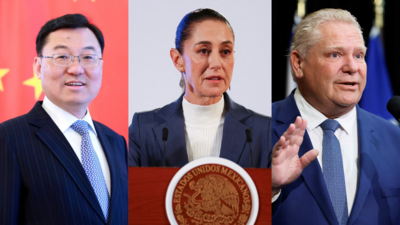
US President-elect Donald Trump has announced his intention to impose tariffs on imports from Mexico, Canada, and China, drawing swift condemnation from the three countries. Trump posted on his Truth Social platform that he would impose a 25% tariff on goods Mexico and Canada and a 10% tariff on Chinese imports immediately after taking office on January 20.
Trump claims that the tariffs are aimed at curbing the flow of illegal fentanyl medicinesand migrants to the United States. However, critics argue that the plan risks violating the US-Mexico-Canada Agreement (USMCA), a trade deal Trump himself negotiated and signed into law in 2020. Post Trump said: “Both Mexico and Canada have the absolute right and power to easily solve their problems this long”
“It’s time for him to pay a heavy price!” He also claimed in another post that China has not stopped the smuggling of fentanyl into the US.
Trump often uses trade threats to gain the upper hand in negotiations, but experts warn this strategy could backfire. It could also increase inflation and disrupt supply chains in tight-knit markets, as USA Today reported.
China: ‘No one wins a trade war’
China has been quick to respond to Trump’s tariff plans. Liu Pengyu, a spokesman for the Chinese Embassy in Washington, rejected Trump’s accusations that Beijing had failed to prevent the smuggling of fentanyl precursors. “The idea that China is deliberately allowing fentanyl precursors to flow into the United States is not true to the facts and reality,” Liu said. “No one is going to win a trade war or a tariff war,” he said.
Trump has often targeted China with his trade policies, imposing tariffs on billions of dollars of Chinese goods during his first term. Experts believe the new plan could reignite tensions and damage the economy. While the tariffs focus on migration and drugs, some think the real goal is to limit China’s influence in North America.
Andrew Law, founder of The Mexico Brief, said, “Trump sees an opening to push China further away from America’s background. This is less a policy declaration than a move to harass an ally.
Canada: ‘Destroying for workers’
Canada, one of the United States’ largest trading partners, also raised concerns. Ontario Premier Doug Ford warned the tariffs would hurt jobs and workers in both provinces.
Oil is Canada’s top export to the United States, while the U.S. relies heavily on Canadian-made goods like auto parts. Trump’s proposed tariffs risk upsetting economic ties that, by 2022, see trade between the two countries peak at $790 billion.
Ford added that industries like car manufacturing, which depend on seamless cross-border supply chains, will be hit hard. For example, components for cars assembled in the US often cross the border several times during production.
Experts warn that disrupting the relationship could raise prices for consumers and put thousands of jobs at risk. Trump, however, appeared firm, claiming the tariffs would push Canada to deal with immigration and drug issues.
Mexico: ‘One tariff response will be another’
Mexico, a major U.S. trading partner with more than $855 billion in annual trade, could be affected by Trump’s tariffs. President Claudia Sheinbaum criticized the plan, saying it would harm both economies.
“The response to one rate will be another until we put in the company the risk that we share,” said Sheinbaum. He drew attention to the possible downfall of US companies like General Motors and Ford, which operate assembly plants in Mexico.
Sheinbaum emphasized his country’s efforts to address migration, citing a “holistic approach” that has reduced US border encounters by more than 75% since last December. He also suggested that the US drug problem, particularly the fentanyl crisis, is a public health problem that requires domestic solutions.
Despite the criticism, Sheinbaum expressed a willingness to engage in dialogue with the incoming Trump administration. “Why put a tax on them that will be dangerous? It is unacceptable,” he said, calling for a collective approach to overcome shared challenges.




